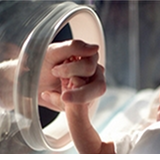- Home apnea monitor
Apnea of prematurity

babyadmin |
Apnea refers to an episode where a person stops breathing for more than 20 seconds. This condition is common among premature babies who are born earlier than 35 weeks. The more premature the child, the more likely they are to have apnea. On average about half of premature babies have apnea of prematurity.
Symptoms of Apnea
In any infant, it is normal to observe some breathing irregularities, where they will have short periods of shallow or no breathing (no more than 10 seconds) before resuming regular breathing. For infants with apnea, each apnea spell may last 20 seconds or more. You will likely observe a drop in heart rate (bradycardia) to below 80 beats a minute, and the baby may get pale or bluish around the face and mouth. Apnea spells can occur several times a day, and are more commonly observed when the baby is asleep. There may be, however, individual differences among infants in the symptoms displayed.
Causes of Apnea
Premature infants were not able to stay in the mother’s womb long enough for their brains to fully develop. Apnea can be a result of brain immaturity in the area that controls breathing. Obstructive apnea is also common among preemies. This refers to apnea spells that occur when the baby’s tiny airway is blocked by mucus or kinks. Often both kinds of apnea are observed in preemies. This condition is worsened due to other problems that are associated with prematurity, including heart or lung issues, infection, anemia, temperature regulation issues, feeding issues and low oxygen.
Risks of Apnea
Having your baby diagnosed with apnea may be worrying, but this is a problem that most babies outgrow. Apnea of prematurity usually subsides once the baby passes 36 weeks. The key is to ensure that while the baby is still experiencing apnea, they are well monitored and the apnea spells are promptly addressed.
Dealing with Apnea
Apnea of prematurity will likely be diagnosed before your baby leaves the hospital. Particularly if your child is younger than 34 weeks, they will be admitted to the neonatal intensive care unit (NICU) for monitoring and treatment. To treat apnea, infants are given a low dose of caffeine either orally or intravenously (through the veins). Their breathing and heart rate are also monitored around the clock using an apnea monitor. Should their breathing or heart rate fall below normal, the NICU staff will immediately check for signs of distress, and will stimulate your baby’s breathing if necessary. This is done either by rubbing their body, or by administering oxygen. If the blockage is due to mucous, they may also use a suction machine to clear their airway. They will also check to make sure that the episodes are not due to other factors such as infection. Very small babies who have severe apnea may need to be hooked up to a nasal continuous positive airway pressure (NCPAP) machine or a ventilator to help them breathe.
Your doctor may decide to discharge your baby if their apnea spells lessen and can be monitored at home. You may also be asked to continue the caffeine medication at home.
Medical homecare equipment explained:
